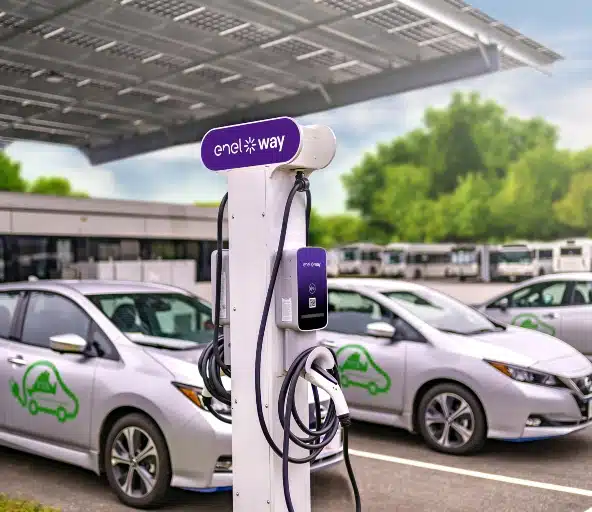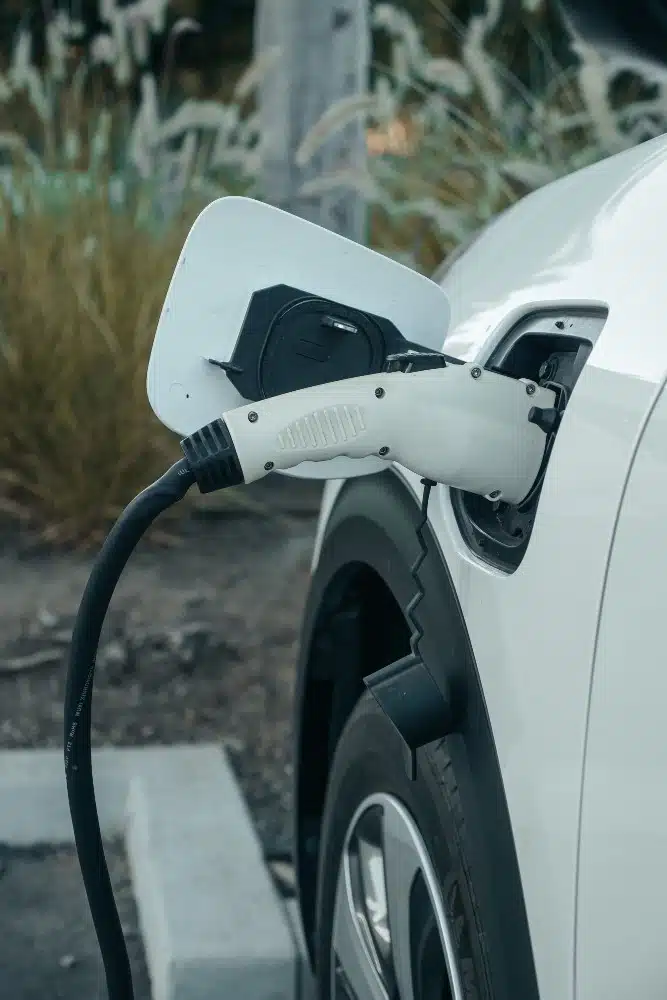EV Charger Installation Cost
How Much Does It Cost to Install an EV Charger?
The cost of installing a commercial EV charger in Chicago varies, with prices typically ranging from $3,500 to $10,000+, depending on charger type, installation complexity, and available incentives. Consult with professionals for a tailored estimate.

Initial Thoughts
With the meteoric rise of electric vehicles (EVs), the demand for EV chargers, especially in urban settings like Chicago, has never been higher. For businesses, this presents a unique opportunity to not only support green initiatives but to also attract a growing segment of the EV-driving public.
At Chicago EV, we pride ourselves on being one of the premier providers of commercial EV charger installations in the Chicagoland area. Through our preferred partnership with Enel X, a global leader in EV charging solutions, we offer a seamless experience from purchase to installation.
If you’re considering installing an EV charger for your commercial space, one of the most common questions we encounter is: “How much will it cost?” While the final figure can vary based on a range of factors, we’ll break down the key components to give you a clearer picture.

Cost of the Charger
The shift towards sustainable transportation isn’t just about the cars on the roads – it’s also about the infrastructure that supports them. As the electric vehicle industry continues to thrive, especially in urban hubs like Chicago, businesses are now seeing the multifaceted benefits of installing commercial EV chargers. However, the initial step into this journey often begins with one central question: How much does the charger itself cost?
Basic vs. Advanced Chargers
At its most basic, a commercial-grade Level 2 charger might start around the lower end of the $3,000 mark. These simpler models provide charging capabilities without many of the bells and whistles. However, for businesses looking to offer a superior user experience or collect data, more advanced models come equipped with features such as touch screens, WiFi connectivity, and more.
Power and Speed
Chargers with higher power outputs tend to be pricier. But they also offer faster charging times, which can be a significant advantage for commercial settings where customers may be parked for shorter durations.
Dual or Single Port
Single port chargers are typically less expensive, but dual-port options allow two vehicles to charge simultaneously, offering better space efficiency and catering to more customers.
Branding and Customization
Some models offer customization, allowing businesses to incorporate their branding or messaging on the chargers. This feature can add to the cost but also enhances brand visibility.
Smart Features
The integration of smart technology can increase the cost, but it also offers advantages like dynamic pricing based on demand, energy monitoring, and integration with renewable sources.
Installation Costs
The cost of the EV charger unit is just one piece of the puzzle. Equally critical, and often quite varied, is the price associated with the installation. Let’s delve into the nuances that might influence the installation costs for a commercial EV charger:
- Site Assessment: Before any installation begins, a thorough site assessment is required. This determines the feasibility, optimal placement, and any potential challenges. Depending on the provider, this could be a separate charge or bundled with the installation cost.
- Electrical Upgrades: Older properties might need an upgrade to their existing electrical systems to handle the increased load of an EV charger. This could involve the installation of a new circuit, upgrading the main panel, or even increasing the service capacity from the utility provider.
- Trenching and Conduit: If the charger is located a distance away from the electrical source, you might require trenching or conduit installation. This means digging up sections to lay down electrical cables securely.
- Labor Costs: Labor is a significant portion of installation expenses. As previously mentioned, electricians in Chicago typically charge between $70 to $100 per hour. However, it’s not just the hourly rate to consider, but the expertise and experience they bring.
- Permitting & Inspection: All installations must adhere to local regulations, and Chicago has its specific set of codes and standards for EV charger installations. The process involves acquiring the necessary permits before the start of the installation and scheduling inspections post-installation to ensure everything is up to code.
Additional Features
In the fast-evolving world of EV charging, going beyond the basic functionalities can offer businesses a competitive edge. Incorporating advanced features not only heightens the user experience but also provides business owners with an array of tangible benefits.
Networked systems are a prime example of this. Such systems come equipped with capabilities that allow proprietors to set and adjust user fees based on demand, time-of-day, or other parameters. This can transform an EV charging station from a mere amenity to a revenue-generating asset.
Furthermore, smart chargers, now more than ever, are becoming intertwined with data analytics. By utilizing these advanced chargers, businesses can collect valuable data on usage patterns, peak charging times, and more. This information can be instrumental in making informed decisions about future expansions, pricing adjustments, or marketing initiatives.
Integrating renewable energy sources, like solar or wind, with your EV charger can also be an enticing feature. It not only reduces electricity costs but also amplifies your commitment to sustainability, a factor increasingly influencing consumer choices.
Incentives and Rebates
When considering the financial investment of installing an EV charger, it’s imperative to factor in the potential savings and returns afforded by various incentives and rebates. Governments and municipalities are keenly aware of the environmental benefits of electric vehicles and have thus introduced several schemes to accelerate the adoption of EV infrastructure.
In Illinois, for instance, numerous incentives, both at the state and local levels, are designed to reduce the initial costs for businesses. Beyond just direct rebates, there are tax credits available for businesses that make the move towards supporting sustainable transportation.
These credits can significantly offset the installation costs and should be a primary consideration in any budgeting or financial forecasting related to EV charger installations. However, navigating the landscape of incentives and understanding eligibility criteria can be a daunting task.
Leveraging the expertise of specialists, like our team at Chicago EV, can ensure you’re not only compliant but also maximizing all available financial benefits. By integrating these incentives, many businesses find that the return on investment for an EV charger is realized much sooner than initially anticipated, making the decision both eco-friendly and economically sound.
Final Thoughts
While it’s challenging to provide a one-size-fits-all number due to the variables involved, a general ballpark for a commercial EV charger installation in the Chicagoland area, including the unit and installation, ranges from $3,500 to $10,000+. With potential revenue from user fees and the added value to your property, many businesses find the investment well worth it.
As the demand for EV charging infrastructure grows, having an EV charger at your commercial location will not only be a boon for business but will position you as a forward-thinking leader in sustainability. If you’re thinking of joining the EV revolution in Chicago, Chicago EV and Enel X are here to help every step of the way. Reach out to us today for a personalized quote.